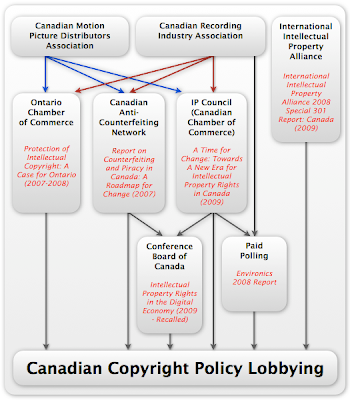A Wikileaks cable from 2005 reveals that the Canadian Motion Pictures Distributors Association, the Canadian arm of the MPAA, told the U.S. embassy that it supports the notice-and-notice approach for ISP liability. The cable states that “in CMPDA’s view, the advent of peer-to-peer filesharing has lessened the need for notice-and-takedown, […]
Post Tagged with: "cmpda"
Is The MPAA Serious About Enforcing Its Copyrights in Canada?
The Canadian Motion Picture Distributors Association (and its parent MPAA), which represents the major Hollywood studios, is one of the leading voices for DMCA-style legislation. It is also one of the most effective Canadian lobby groups as evidenced by the amazing speed with which it convinced Canada to become one of the only countries in the world to enact specific anti-camcording legislation (what made it particularly remarkable was that Canadian officials believed for months that the law already addressed the issue and the industry did little more than provide wildly inconsistent statistics and threaten to withhold some film screenings).
Interestingly, while the CMPDA claims that it needs stronger enforcement powers in Canada, David Allsebrook, a top IP lawyer with LudlowLaw, points out in his forthcoming submission to the copyright consultation that the industry has seemingly little interest in pursuing criminal copyright cases in Canada. Allsebrook highlights the fact that the movie industry does not appear to regularly register its own films with CIPO. Although registration is not required under the law, it is pretty standard if one anticipates possible enforcement action. As Allsebrook notes:
The MPAA is trying to manoeuvre Canada and all other countries into enforcing its members’ rights for them, at the countries’ expense. MPAA members have no intention of seeking criminal prosecution for copyright infringement of their movies in Canada. The MPAA’s strategy can be simply demonstrated. In order to prove criminal copyright infringement in Canada, the first step is to file in evidence a Canadian copyright registration, because it substitutes for expensive witnesses as proof of the existence and ownership of copyright, unless there is a reason to question its veracity. However to be admissible the copyright must have been registered in Canada before the infringement took place. The ten top-grossing movies of 2009, as of the end of july, were all produced by members of the MPAA. Only three of the ten movies’ copyrights were registered in Canada by that time. The registration fee is $50.00, and registration may be done very simply, and online, from anywhere in the world.
The lack of registration is particularly telling since the MPAA believes that 90 percent of its piracy comes from copies of movies made by videotaping a showing of the movie in a cinema. The most damaging piracy takes place at the beginning of the film’s release, when the infringing copies can circulate around the world electronically long before the film is exhibited or authorized copies released internationally. The MPAA members have not taken the most basic step towards stopping this activity in Canadian Courts.
I conducted a similar review of the top 10 grossing U.S. films as of last week. At the moment, only half have Canadian copyright registrations.
Hill Times Features Op-Ed Copyright Lobby Recycling
The Hill Times features a full-page opinion piece (sub req) (PDF version) based on my recent post on copyright lobby policy laundering.
Unravelling the Canadian Copyright Policy Laundering Strategy
The Conference Board of Canada plagiarism and undue influence story – which with the Board's report and overdue apology to Curtis Cook will now go on hiatus until new reports are issued in the fall – has obviously attracted considerable interest. Looking back, while plagiarism is rare, it is the public airing of the copyright lobby policy laundering effort that is the far more important development.
This lengthy post seeks to unravel the effort further by demonstrating how there has been a clear strategy of deploying seemingly independent organizations to advance the same goals, claims, arguments, and recommendations. Over the past three years, this strategy has played out with multiple reports, each building on the next with a steady stream of self-citation. The following diagram highlights the key players:
 |
Unravelling the Canadian Copyright Policy Laundering Strategy
The Conference Board of Canada plagiarism and undue influence story – which with the Board’s report and overdue apology to Curtis Cook will now go on hiatus until new reports are issued in the fall – has obviously attracted considerable interest. Looking back, while plagiarism is rare, it is the […]






